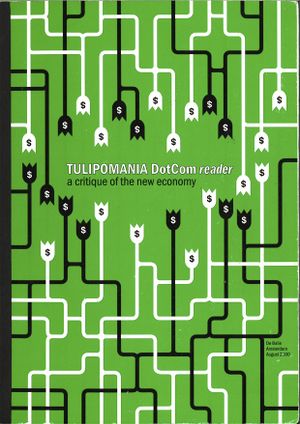Difference between revisions of "Ted Byfield, Menno Hurenkamp, Andreas Kallfelz, Eric Kluitenberg, Geert Lovink (eds.) (2000) Tulipomania DotCom Reader"
| (2 intermediate revisions by 2 users not shown) | |||
| Line 1: | Line 1: | ||
| − | + | [[File: Tulipomania_DotCom_Reader-img.jpg | thumbnail | right]] | |
| − | + | == <small>'''Abstract'''</small> == | |
| − | + | In times of rapid growth of new media as an economic factor, the danger of creating a stagnating cultural ghetto is immediate. The aim of Tulipomania was not to express “Schadensfreude” towards all those who gambled – and lost, nor to mobilize resentment towards the steadily growing number of Internet millionaires. The conference was neither organised to call for state-lead interventionism against the monopolizing tendencies of the narrow ‘winner-takes-all’ business model promoted through the DotCom hype. There is enough (self)confidence to leave these easy anxieties aside and appeal to a much more powerful, temporary, networked collaborative imagination. Technical skills are no longer enough. Unlike perhaps five or ten years ago, we need a firm, broad, critical, compassionate knowledge of the Internet economy, one in which analysis opens a multitude of possibilities for involvement. | |
| + | == <small>'''File'''</small> == | ||
| − | + | [[File: Tulipomania_DotCom_Reader.pdf]] | |
| − | [[ | + | == <small>'''Source'''</small> == |
| − | [[ | + | |
| − | [[ | + | [[Institute_of_Network_Cultures|Institute of Network Cultures]] |
| − | [[ | + | |
| − | [[ | + | == <small>'''Links'''</small> == |
| − | [[ | + | |
| − | [[ | + | '''URL:''' http://networkcultures.org/blog/publication/tulipomania-dotcom-reader/ |
| − | [[ | + | |
| − | [[ | + | '''Wayback Machine:''' https://web.archive.org/web/*/http://networkcultures.org/blog/publication/tulipomania-dotcom-reader/ |
| − | [[ | + | |
| + | |||
| + | [[Category:Library]] | ||
| + | [[Category:Institute of Network Cultures]] | ||
| + | [[Category:Ted Byfield]] | ||
| + | [[Category:Menno Hurenkamp]] | ||
| + | [[Category:Andreas Kallfelz]] | ||
| + | [[Category:Eric Kluitenberg]] | ||
| + | [[Category:Geert Lovink]] | ||
| + | [[Category:English]] | ||
| + | [[Category:Holland]] | ||
| + | [[Category:2000]] | ||
Latest revision as of 18:26, 10 May 2017
Contents
Abstract
In times of rapid growth of new media as an economic factor, the danger of creating a stagnating cultural ghetto is immediate. The aim of Tulipomania was not to express “Schadensfreude” towards all those who gambled – and lost, nor to mobilize resentment towards the steadily growing number of Internet millionaires. The conference was neither organised to call for state-lead interventionism against the monopolizing tendencies of the narrow ‘winner-takes-all’ business model promoted through the DotCom hype. There is enough (self)confidence to leave these easy anxieties aside and appeal to a much more powerful, temporary, networked collaborative imagination. Technical skills are no longer enough. Unlike perhaps five or ten years ago, we need a firm, broad, critical, compassionate knowledge of the Internet economy, one in which analysis opens a multitude of possibilities for involvement.
File
File:Tulipomania DotCom Reader.pdf
Source
Links
URL: http://networkcultures.org/blog/publication/tulipomania-dotcom-reader/
Wayback Machine: https://web.archive.org/web/*/http://networkcultures.org/blog/publication/tulipomania-dotcom-reader/
